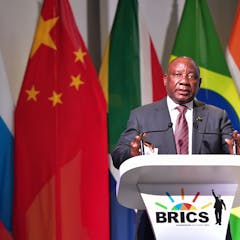
Articles on Cuba
Displaying 1 - 20 of 157 articles

Cuban has yo-yoed on and off the US list of state sponsors of terrorism. Is the Biden administration changing that?

People who enter the US as refugees or with asylum generally adapt quickly and become productive members of society. But cities need help getting them settled and employed.

During the Cuban missile crisis, World War III was likely averted by what one US official called ‘just plain dumb luck.’

Cuba’s economy – saddled by US sanctions and ill-timed reforms – is in dire straits.

Community-centred approaches to urban agriculture have been successful in various parts of the world.

Cuba gets less attention as an espionage threat than Russia or China, but is a potent player in the spy world. Its intelligence service has already penetrated the US government at least once.

One set of ideas runs counter to the mainstream consensus that technology will save us from climate change. Can degrowth ever win enough converts to persuade humanity to change course?

Beloved in his hometown of Plains, Georgia, Jimmy Carter became the 39th US president and used his office to make human rights a priority throughout the world.

It is not mere expansion, but the character of the expansion which will guide the five Brics countries on whether they admit new members.

The sites provide a rare tangible record of the international solidarity that existed during the Cold War.

It came about through sustained contact with native Spanish speakers who directly translated phrases from Spanish into English, a form of linguistic borrowing called ‘calques.’

Cubans turned out in higher numbers than expected at the recent elections.

Carter’s work in Zimbabwe forms a significant and under appreciated part of his legacy

The island is facing the harshest economic conditions since the 1990s, prompting 224,000 people to leave in 12 months.

South Africa’s foreign policy under Ramaphosa emphasises economic diplomacy and ‘progressive internationalism’, which promotes global equity and ending the dominance of the global north.

Despite decades of progress on nonproliferation, Russia’s new threats of nuclear strikes bring to mind that convincing countries to reduce their nuclear weapons has long been very difficult.

Cuba is acting on the scientific fact that humanity will be safest when all who can be vaccinated are vaccinated. It is following the science and earning its trusted reputation.

A military historian and U.S. Army veteran explains how wars are not easy to win – something political leaders often forget when looking at the calculus of conflict.

Some economic sanctions may violate international law principles, including those the sanctions are intended to enforce. They may therefore undermine the very legal regimes Canadians champion.

Attacking your own side and blaming your foe has a long history and a firm grip on the popular imagination. But the internet makes it difficult to pull off – and less desirable.
